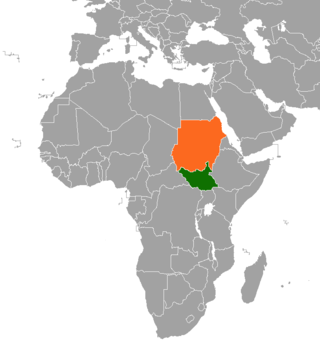
Jonglei State is a state of South Sudan with Bor as its centre of government and the biggest city. Jonglei state comprises nine counties: Bor, Akobo, Ayod, Uror, Duk, Nyirol, Pigi, Twic East, and Fangak. Jonglei State is the largest state by area before reorganisation, with an area of approximately 122,581 km2, as well as the most populous according to the 2008 census conducted in present-day South Sudan's second period of autonomy. The boundaries of the state were again changed as a result of a peace agreement signed on 22 February 2020.

Bor is a historic city in the Bor County of Jonglei State, in the Greater Upper Nile region of South Sudan, being the epicenter of national liberation revolution with multiple landmarks that tells the story. In Malual-Chaat barrack, statues of liberators and destroyed weapons are conserved and exhibited at historical heritage site. It has also served as the headquarters of Jonglei state. The city is situated on the east side of the White Nile at the southern extent of the sudd, South Sudan's vast central wetlands.
Akobo Airport is an airport serving the town of Akobo, in Jonglei State, South Sudan.

Akobo, is a town in South Sudan.

Pibor, also called Pibor Post, is a town in South Sudan.

Sudanese nomadic conflicts are non-state conflicts between rival nomadic tribes taking place in the territory of Sudan and, since 2011, South Sudan. Conflict between nomadic tribes in Sudan is common, with fights breaking out over scarce resources, including grazing land, cattle and drinking water. Some of the tribes involved in these clashes have been the Messiria, Maalia, Rizeigat and Bani Hussein Arabic tribes inhabiting Darfur and West Kordofan, and the Dinka, Nuer and Murle African ethnic groups inhabiting South Sudan. Conflicts have been fueled by other major wars taking place in the same regions, in particular the Second Sudanese Civil War, the War in Darfur and the Sudanese conflict in South Kordofan and Blue Nile.

Akobo County is a county in South Sudan.
Akobo Heritage and Memorial University (AHMU) is a university in South Sudan.
Ethnic violence in South Sudan has a long history among South Sudan's varied ethnic groups. South Sudan has 64 tribes with the largest being the Dinka, who constitute about 35% of the population and predominate in government. The second largest are the Nuers. Conflict is often aggravated among nomadic groups over the issue of cattle and grazing land and is part of the wider Sudanese nomadic conflicts.

The Nuer White Army, sometimes decapitalised as the "white army", is a semi-official name for a militant organisation formed by the Nuer people of central and eastern Greater Upper Nile in modern-day South Sudan as early as 1991. According to the Small Arms Survey, it arose from the 1991 schism within the Sudan People's Liberation Movement/Army (SPLM/A) for the dual purpose of defending Nuer cattle herds from neighbouring groups and fighting in the Second Sudanese Civil War between the SPLM/A and the Sudanese government.

Boma State was a state in South Sudan that existed between 2 October 2015 and 22 February 2020. It was located in the Greater Upper Nile region and was formerly part of the state of Jonglei. The state bordered Akobo State, Imatong State, Jonglei State, Kapoeta State, Bieh State, Terekeka State and the country of Ethiopia to the east.

Bieh State was a state in South Sudan that existed between 2 October 2015 and 22 February 2020. It was located in the Greater Upper Nile region and it bordered Fangak to the west, Central Upper Nile to the north, Latjoor and Akobo to the east, and Jonglei to the south.
This article lists events from the year 2019 in South Sudan
The disarmament of the Lou Nuer was a forcible disarmament campaign undertaken by the SPLA in Southern Sudan in December 2005. While other groups had been peacefully disarmed, the Lou section of the Nuer in Northern Jonglei State refused to comply. The SPLA organized a force under Peter Bol Kong to forcibly disarm the Lou Nuer, whose White Army resisted until a defeat in the battle of Motot, after which they fled the area.
Motot is a town in the Uror County of Jonglei State, in the Greater Upper Nile region of South Sudan.
Timothy Taban Juch is a South Sudanese politician and the former governor of Akobo State in South Sudan.

Denay Jock Chagor is a South Sudanese politician and the governor of Jonglei State since July 2020.
Martha Chol Luak Kok is a South Sudanese politician. She hails from Akobo County. As of 2009 she was the acting speaker of the Jonglei State Legislative Assembly. She was elected to the Jonglei State Legislative Assembly in 2010 as a National Congress Party women's list candidate.

Elections were held in Jonglei State on 10–15 April 2010 as part of the 2010 Sudanese general election, with voting for President of Sudan, National Assembly of Sudan, President of Southern Sudan, Southern Sudan Legislative Assembly, Governor of Jonglei State and the Jonglei State Legislative Assembly. The elections were the first in Sudan for over two decades, held in the aftermath of the 2005 Comprehensive Peace Agreement between the Sudan People's Liberation Movement (SPLM) and the Government of Sudan of Omar al-Bashir. The election was carried out in precarious security conditions, with ethnic conflicts prevalent in the state. The elections were won by the SPLM, with the exception of a handful of seats. Disputes over the election results led to the outbreak of two armed insurgencies.

George Athor's rebellion was an uprising in the Southern Sudan Autonomous Region which lasted from April 2010 to December 2011. Organized by South Sudanese military commander and politician George Athor, the conflict mainly took place in the states of Upper Nile and Jonglei as well as some border areas.













